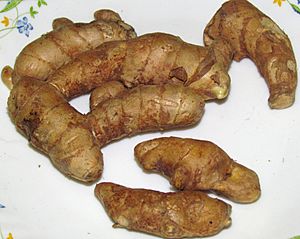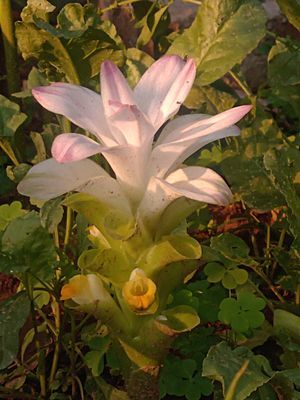Mango ginger facts for kids
Quick facts for kids Mango ginger |
|
|---|---|
 |
|
| Scientific classification |
|
| Kingdom: | Plantae |
| Clade: | Tracheophytes |
| Clade: | Angiosperms |
| Clade: | Monocots |
| Clade: | Commelinids |
| Order: | Zingiberales |
| Family: | Zingiberaceae |
| Genus: | Curcuma |
| Species: |
C. amada
|
| Binomial name | |
| Curcuma amada Roxburgh
|
|
| Script error: The function "autoWithCaption" does not exist. | |
| Synonyms | |
|
Curcuma mangga Valeton & van Zijp |
|
Script error: No such module "Check for conflicting parameters".
Mango ginger, also known as Curcuma amada, is a cool plant that belongs to the same family as regular ginger. It's also a close cousin to turmeric, which you might know from its bright yellow color. Even though it looks a lot like common ginger, mango ginger has a special secret: it tastes like fresh, raw mango! It doesn't have the spicy kick of regular ginger.
Contents
What is Mango Ginger?
Mango ginger is a plant that grows underground stems called rhizomes. These rhizomes are the part we eat. They look a lot like regular ginger roots. But instead of being spicy, they have a sweet, earthy, and slightly peppery taste that reminds many people of green mangoes.
How People Use Mango Ginger
This unique plant is super popular in cooking, especially in places like India and Nepal.
- In southern India, people use its rhizomes to make yummy pickles.
- In northern India, it's often turned into tasty chutneys.
- In Nepal's southern plains, mango ginger is served as a chutney at big community feasts. A popular dish there is a pickle made from mango ginger and elephant foot yam.
- It's a delicious addition to salads and stir-fries.
- You can find mango ginger used in many dishes across South Asia, Southeast Asia, and even some parts of East Asia.
Health Benefits of Mango Ginger
For a long time, people have used mango ginger in traditional medicine systems like Ayurveda and Unani medicine. They believed it could help with many things.
Traditional Uses
- It was used to help with digestion.
- Some thought it could act as a diuretic, helping the body remove extra water.
- It was also used as a laxative and to help with coughs and colds.
- Locally, people still use it to help relieve cold, cough, and even bronchitis.
Modern Research
Scientists today are studying mango ginger to understand its health benefits better. They have found that it has many helpful properties:
- Antioxidant activity: This means it can help protect your body's cells from damage.
- Antibacterial activity: It can help fight against certain types of bacteria.
- Antifungal activity: It may help stop the growth of some fungi.
- Anti-inflammatory activity: This means it can help reduce swelling and pain in the body.
- It's also being studied for its potential effects on allergies and other body functions.
Scientists are looking at the different natural chemicals found in mango ginger, such as starches, oils, and special compounds called curcuminoids and terpenoids. These are the parts that give mango ginger its unique flavor and health benefits.
 | Roy Wilkins |
 | John Lewis |
 | Linda Carol Brown |


